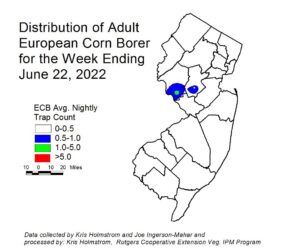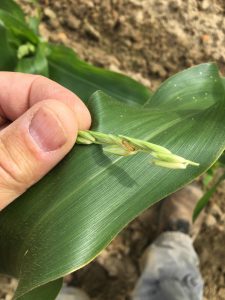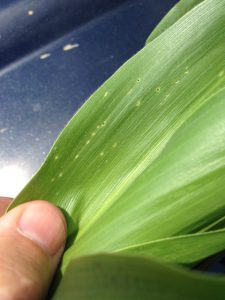Pathogens such as Fusarium, Pythium, Phytophthora, Thielaviopsis and Rhizoctonia that cause pre- and post-emergent damping-off can cause serious problems in organic (and conventional) production.
The key to controlling and/or suppressing damping-off pathogens with biological controls is keeping the biological populations high and continually present on root surfaces of the host, and by following good cultural practices. [Read more…]
Vegetable Crops Edition
Seasonal updates and alerts on insects, diseases, and weeds impacting vegetable crops. New Jersey Commercial Vegetable Production Recommendations updates between annual publication issues are included.
Subscriptions are available via EMAIL and RSS.
Quick Links:
 NJ Commercial Vegetable Production Recommendations
NJ Commercial Vegetable Production Recommendations
 Rutgers Weather Forecasting - Meteorological Information important to commercial agriculture.
Rutgers Weather Forecasting - Meteorological Information important to commercial agriculture.
Organic Production: Suppressing Soil-borne Pathogens in 2022
Quick reviews of fungicide chemistries, FRAC groups, and fungicide resistance management
For a quick review on fungicides, FRAC groups, and managing fungicide resistance development please click on the links below.
Using tank mixes and fungicide rotations and information on FRAC group 4, FRAC group 7, and FRAC group 3 and FRAC group 11 fungicides.
Preparing for cucurbit downy mildew in 2023
In 2004, cucurbit downy mildew re-emerged in the US with a vengeance causing significant losses in cucurbit production. In most years prior to this, concern for CDM control was minimal, since the pathogen arrived late in the growing season (in more northern regions), or the pathogen caused little damage, or never appeared. After 2004, with significant losses at stake, and with very few fungicides labeled for its proper control, CDM became a serious threat to cucurbit production. Importantly, at the time, cucumber varieties with very good levels of CDM resistance were no longer resistant, suggesting a major shift in the pathogen population. Research done over the past 19 years has led to a better understanding of the pathogen. Recent research has determined that the CDM falls into two separate clades: Clade I and Clade II. [Read more…]
Bacterial leaf spot control and copper resistance survey in 2023
Copper resistance in bacterial leaf spot of tomato and pepper crops has been detected at a high level in New Jersey the past few summers. While not surprising, copper resistance has been known to develop for decades now. Copper applications for the control of bacterial diseases in many crops has been a mainstay for decades now and is often applied in weekly protectant fungicide programs. With help from Dr. Nrupali Patel and Dr. Don Kobayashi, bacteriologists in the Department of Plant Biology located on the New Brunswick campus, a (NJ-VGA funded) survey was initiated to determine which species of bacterial leaf spot are most prevalent in New Jersey tomato and pepper crops. Bacterial leaf spot can be caused by four species of Xanthomonas: X. euvesicatoria, X. vesicatoria, X. perforans, and X. gardneri. Currently, there are four races of BLS found in tomato (T1-T4; one for each of the 4 species stated above) and eleven races found in pepper (0-10). Differential tests in southern New Jersey using various bell pepper lines over the past 15 years has suggested that the number of races of BLS in pepper has increased over time; with all races present in the State to date. Lab testing results from samples collected from the small number of NJ vegetable farms the last three summers has shown the presence of X. euvesicatoria in pepper, as well as X. euvesicatoria and X. perforans in both tomato and pepper in the state, with ~60% of all samples testing positive for copper resistance.
Phytophthora blight control in pepper in 2023
Phytophthora blight typically develops in low-lying areas after a heavy rain and can spread quickly throughout the entire field. Fortunately, New Jersey has been really dry this summer, but that does not need you don’t need to prepare for potential Phytophthora issues down the road. This is particularly important if are in fields with a known history of Phytophthora blight. Although the extended period of dry weather works against Phytophthora development, it does not mean it will not show up eventually. [Read more…]
Vegetable IPM Update 6/22/22
Sweet Corn
Low numbers of European corn borer (ECB) moths continue to be captured at levels similar to last week, and feeding in whorl and pre-tassel stage corn more common. The highest adult activity remains in Hunterdon County (see map below at right). ECB injury over the threshold of 12% of plants infested has been found in many areas this week. It is typical for feeding percentages to rise as the moth catch declines. We expect feeding to increase for the next week or so before peaking.
 Look for the characteristic “shot-hole” type of feeding (photo below at right) and consider treating when infested plants exceed 12% in a 50 plant sample. As plantings proceed to the pre-tassel stage, ECB larvae may be found in emerging tassels (see photo at left). It is a good idea to treat individual plantings as they move into the full tassel/first silk stage one time. This eliminates any ECB larvae that have emerged with the tassels as they begin to move down the stalk to re-enter near developing ears.
Look for the characteristic “shot-hole” type of feeding (photo below at right) and consider treating when infested plants exceed 12% in a 50 plant sample. As plantings proceed to the pre-tassel stage, ECB larvae may be found in emerging tassels (see photo at left). It is a good idea to treat individual plantings as they move into the full tassel/first silk stage one time. This eliminates any ECB larvae that have emerged with the tassels as they begin to move down the stalk to re-enter near developing ears.
Useful insecticides for this particular application include synthetic  pyrethroids (IRAC Grp 3), spinosyns (including OMRI approved Entrust) IRAC Grp 5), and diamides such as Coragen or Vantacor (IRAC Grp 28) or materials such as Besiege which include the active ingredient in Coragen. Synthetic pyrethroids alone should NOT be used for corn earworm (CEW) protection on silking corn. Control with these materials is very inconsistent.
pyrethroids (IRAC Grp 3), spinosyns (including OMRI approved Entrust) IRAC Grp 5), and diamides such as Coragen or Vantacor (IRAC Grp 28) or materials such as Besiege which include the active ingredient in Coragen. Synthetic pyrethroids alone should NOT be used for corn earworm (CEW) protection on silking corn. Control with these materials is very inconsistent.
The highest nightly trap catches of ECB for the week ending 6/22/22 are as follows:
| Sergeantsville 2 | Califon 1 | Old Bridge 1 |
| Allentown 1 | Clinton 1 | Pedricktown 1 |
| Asbury 1 | Dayton 1 | Princeton 1 |
| Bellemeade 1 | Hillsborough 1 | South Branch 1 |
